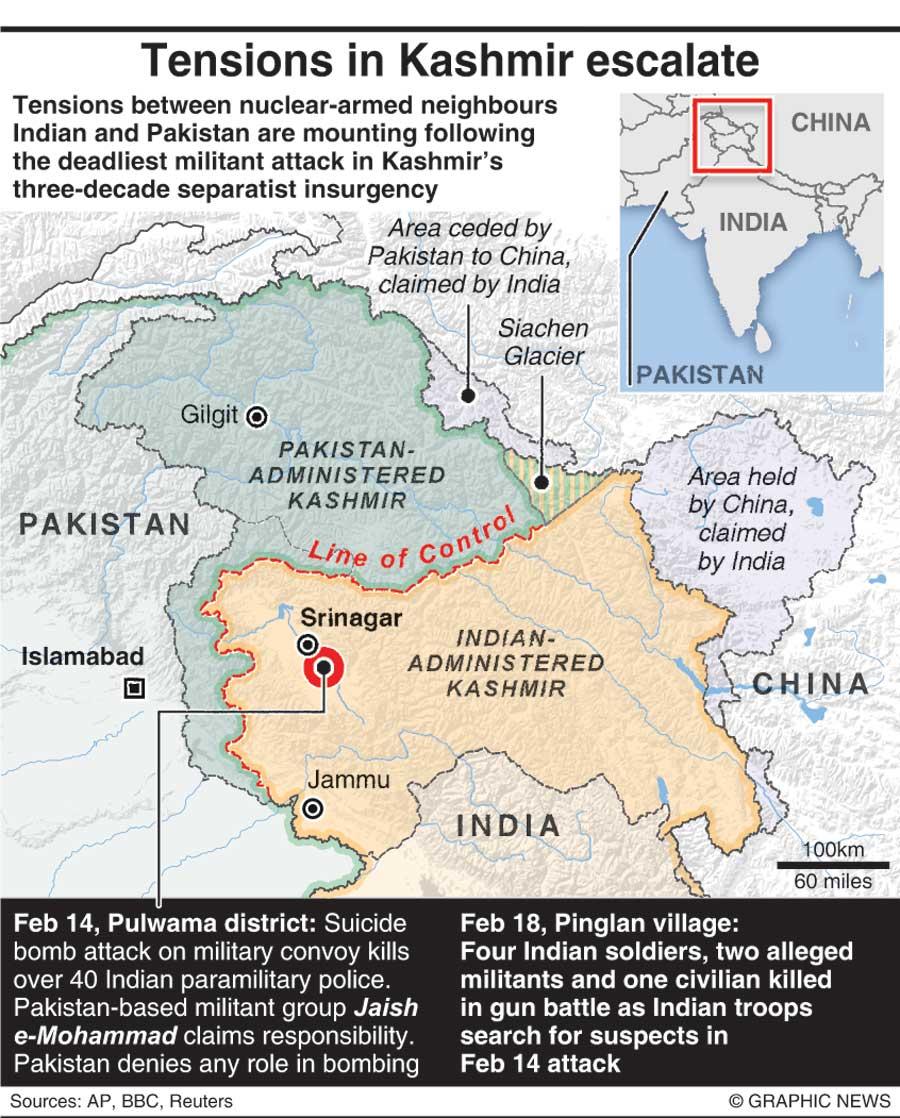Reply To:
Name - Reply Comment
Last Updated : 2024-04-27 00:40:00
 he February 14 attack on an Indian military convoy in the disputed Kashmir region once again underlines the importance of a concerted international effort to find a solution to the seven-decade-old crisis. If the international community is unwilling to say the K-word in deference to India, at least it should not fight shy of expressing serious concern over the danger the crisis poses to the world at large.
he February 14 attack on an Indian military convoy in the disputed Kashmir region once again underlines the importance of a concerted international effort to find a solution to the seven-decade-old crisis. If the international community is unwilling to say the K-word in deference to India, at least it should not fight shy of expressing serious concern over the danger the crisis poses to the world at large.
If India and Pakistan, which have been wrangling over Kashmir since they parted ways as two entities from the subcontinent’s womb, are to go for a nuclear war, it is 99 percent probable that the cause for such a war will be Kashmir.
Millions of deaths apart, the nuclear winter, the attendant famine and radiation-induced diseases will not be confined to the two warring nations. The effects will be felt all over South Asia and neighbouring regions, too. Hence, the urgent need to de-escalate the crisis.
Both India and Pakistan are nuclear powered and claim ownership of the whole of Kashmir, formerly a princely state, one third of which is now controlled by Pakistan. India claims sovereignty over the state on the basis of an instrument of accession signed by the Maharaja of Kashmir in the wake of an invasion by Pakistani tribal warriors in 1947, months after the partition. Pakistan, on the other hand, insists that Kashmir rightfully belongs to it in terms of the partition formula worked out ahead of Independence.
While Pakistan sees a possible solution in a 1948 UN resolution that calls for a plebiscite in the whole of Kashmir, India favours the bilateral process. But, of late, India has been avoiding talks on Kashmir, accusing Pakistan of supporting cross-border terrorism. The February 14 attack that killed 41 Indian soldiers at Pulwana in Kashmir was not a Valentine’s Day tryst to ignite a love relationship between India and Pakistan. Rather, the attack has only added to mutual hatred. That it happened at a time when India was preparing for parliamentary polls in May was unfortunate, for it offered politicians an opportunity to indulge in one-upmanship anti-Pakistan rhetoric, instead of using the political platforms to promote peace with the neighbour.
Tempers are running high in India, with ultranationalists, who enjoy the ruling Bharatiya Jantha Party’s sympathy, calling for revenge. In response, Prime Minister Narendra Modi’s government has given a carte blanche to the armed forces to take whatever action is required to wipe out terrorism from the region. This kind of response will only lead to a further drifting away from a peaceful solution to the problem, the oldest world issue after the Palestinian crisis.
It is wishful thinking to expect Modi to act in a statesmanlike manner, given the exigencies of the elections. Yet the situation warrants a serious introspection on the causes that led to the February 14 incident. The attack did not take place in a vacuum. For the past two years or so, the Modi government, while claiming that it has defeated the Kashmiri militancy that arose in support of independence or union with Pakistan, has been allowing the troops to use excessive force to deal with the rebellion in the Muslim-majority region.
Human rights groups claim that close to 100,000 people have died since the Kashmiri uprising erupted in 1989. India disputes this figure.
In the past year or so, rights groups say about 3,000 Kashmiri’s have been wounded in the eye by the pellets fired by Indian troops. In November last year, 19-month-old Habeeba became the youngest victim to suffer eye injury by pellet firing.
"Tempers are running high in India, with ultranationalists, who enjoy the ruling Bharatiya Jantha Party’s sympathy, calling for revenge. In response, Prime Minister Narendra Modi’s government has given a carte blanche to the armed forces to take whatever action is required to wipe out terrorism from the region"
The Indian military’s excesses only drive youth to radicalism. The youth who carried out the suicide attack on February 14, it is said, had been subjected to torture after being picked up Indian troops.
The Indian media largely report the heroics of the troops, while downplaying the suffering of the Kashmiri people or their agitation against the presence of Indian troops in the region, which is easily the world’s most highly militarised area. Often the media narrative happens to be a government handout. With international human rights groups and the media denied entry into Kashmir, it is the social media which largely give the ‘other side’ of the Kashmiri story—about extrajudicial killings, rape, torture and disappearances. Sometimes, the Indian authorities impose an internet blackout to prevent any dissemination of news.
There is little dispassionate discussion on the goings on in Kashmir. A few people like internationally acclaimed author Arundathi Roy have been branded traitors for highlighting the Kashmiri people’s plight and their aspiration for freedom from India. This week, sections of the Indian media took actor-turned politician Kamal Haasan to task for mentioning the Kashmiri plebiscite. New Delhi often cites the people’s participation in the regular elections it holds in the region to dispel claims that a majority of the people want the region to secede from India.
Last week’s attack also raises a major border security question. From where did the militants get the explosives? India blames Pakistan, probably in a bid to imply that the troubles in Kashmir are instigated by extraneous forces. Although the Pakistan-based group Jaishe-e-Muhammad has claimed responsibility for the attack, a question arises as to its ability to cross the highly fortified border.
If the attack had been engineered across the border, then it is a damning indictment on the Indian military’s ability to secure the border. In this hi-tech surveillance era, surely, the world’s fourth most powerful military should be able to prevent crossborder infiltration. The line of control (LOC) that divides Kashmir is heavily manned. It is now not possible for a repetition of the 1998 Kargil clash which erupted when Pakistan-based militants crossed the LOC.
The way forward is not finding a military solution to the issue. India and Pakistan should come together and find a way out.
In his first comment following the February 14 attack, Pakistan’s Prime Minister Imran Khan said that his government was ready to co-operate with India in investigating the attack and urged New Delhi to come for peace talks. But he also said New Delhi should reflect on why Kashmiri youth had reached a point where they no longer feared death. He also had a warning for India. “If you think that you will launch any kind of attack on Pakistan, Pakistan will not just think about retaliation, Pakistan will retaliate.” This is Modi-like cheap political rhetoric aimed at image boosting, but certainly not at winning the hearts of Indians.
India has outright rejected Khan’s offer, pointing out the absence of any condemnation of the attack in his statement. It has also scoffed at his government’s willingness to cooperate in any investigation, saying previous promises had not gone beyond words. However, hardening of positions won’t lead to a thaw in relations.
In Khan, India certainly has a peace partner. He is no stranger to the Indians. They know him as an affable cricketer, who, incidentally led Pakistan’s cricket team when the then Pakistan President, Zia ul-Haq, visited India to join the then Prime Minister, Rajiv Gandhi, in cricket diplomacy for peace in 1987.


Add comment
Comments will be edited (grammar, spelling and slang) and authorized at the discretion of Daily Mirror online. The website also has the right not to publish selected comments.
Reply To:
Name - Reply Comment
US authorities are currently reviewing the manifest of every cargo aboard MV
On March 26, a couple arriving from Thailand was arrested with 88 live animal
According to villagers from Naula-Moragolla out of 105 families 80 can afford
Is the situation in Sri Lanka so grim that locals harbour hope that they coul

26 Apr 2024
26 Apr 2024